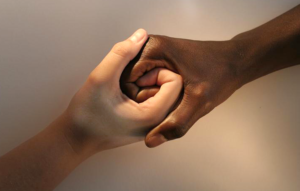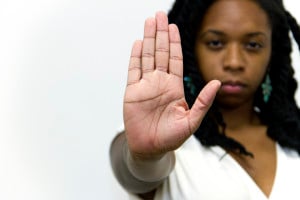Originally published on Scott Woods Makes Lists and republished here with the author’s permission.
 I’d like to take a moment to speak to the white person who thinks a conversation on race is some kind of goal. And while I have your ear, I’d like to say something to your cousin, White Person Who Wants Me To Explain Racism To Them On The Fly.
I’d like to take a moment to speak to the white person who thinks a conversation on race is some kind of goal. And while I have your ear, I’d like to say something to your cousin, White Person Who Wants Me To Explain Racism To Them On The Fly.
No, and definitely not.
Now, unlike all of the other people who piss on your heads when you try to have (or achieve?) these conversations, I will explain, at great length, why you’re wrong.
Usually when I write something like this, it’s about going on the record for future reference, a “Break In Case of Racial Emergency” fallback. Not today. Today, I’m going to officially share… so I can stop sharing.
Matt Damon did this thing a couple of months ago and we all get why that was a problem. I got exhausted just typing about that again, so forgive me for acting like you know what I’m referring to. To me, his act was laughable, but not infuriating.
I doubt it was infuriating to Effie Brown. She’s heard that kind of thing her entire career, maybe even her life, and what did she have to be mad about? Unlike every other time a movie executive said something racist to her, this one was going to go out into the world because either the editors weren’t savvy enough to cut it or Matt Damon really thought what he said held water.
Either way, the infuriating part of these situations for me is usually in the almost-but-not-quite-an-apology that always follows these situations, and on this count Damon did not disappoint. He mentioned being glad that his comments “started a conversation about diversity in Hollywood. That is an ongoing conversation that we all should be having.”
There are already a lot of articles floating around explaining why that’s a ridiculous statement, so I’ll just point out that this is something that a lot of white people say all of the time, and it’s time we got clear on the value of this conversation you keep mentioning.
A conversation about race in 2015 is not a goal.
It is not a good goal, it is not a reasonable goal, and it is not an equitable goal. In fact, treating the conversation like a goal is offensive to thinking people who have been having these conversations longer than you or your daddy or your grandfather have been alive, let alone the people forced to live as the subjects of your well-meaning conversations.
It is offensive for you to ask me to repeat myself, and depending on how that conversation goes – you know, the one I didn’t ask to have – it is even more offensive that whatever pain I associate with the subject be served up like this week’s food for thought.
It’s why some of you are arguing with Black people right now about the reporter who got (wrongly) shoved away by the well-meaning (now resigned from an appointment but still employed by U of M) professor while trying to capture the protesting at the University of Missouri that’s happening now: because you refuse to empathize. And that is racist.
Not to mention that most of you are horrible conversationalists. You come to the dialogue with tons of cultural determinist baggage. You assume the expanse of my knowledge based on a profile picture. You stereotype.
You only think about racism when the issue makes you boil over here and there, while I have to contend with it – think, deal, confront, navigate, process, argue about, swallow it – all of the time.
You have the luxury of not having to concern yourself with the worst parts of racism entirely, and the uncomfortable parts only as long as you wish to stay in the room. The minute you step outside reality bends to your values, protects your body, distracts you from your sins. Considering the topic of conversation, you don’t have a lot of skin in the game.
And here’s the saddest part: Black people are used to it.
We’re used to every side of this. We’re used to the arguing, we’re used to the dismissal of our suffering, we’re used to the stone cold straight-up bigots on Twitter and Facebook, we’re used to constantly having our pain scrutinized for validity… we’re even used to the actual racist acts that started this whole scenario.
And let me tell you something else that’s going unheralded: What happened at U of M is kind of mild-to-medium racism and it is unerringly consistent with the general Black experience on and off campuses nationwide.
None of this is news to Black people. The only newsworthy aspect of any of this is that the news has deigned to cover it.
But the racist things that happened? Typical. The reaction by students? Not new. The reaction of administration to the students’ reaction to racism? Completely by the book. All of this is happening all of the time on some campus in this country.
If there was a website where students could record incidents, protests and responses from across the country, there wouldn’t be a day when schools are in session that such a site wouldn’t be updated. The only news here is how powerful a football player is, and if we’re honest that’s also not a new concept. We’re just not used to seeing it applied.
My point is that these conversations are beyond repetitive; they’re mundane. Which means my history and my feelings about it have been relegated to banal.
Hey, that’s my life we’re talking about here.
So I have to budget for my time when it comes to racism. It’s pretty entrenched, so I have to keep moving like a Great White Shark, except I’m not fishing for chum; I’m fishing for time. Time to live, time to experience good things, time to learn new things that aren’t for cultural self-defense, but knowing in the back of my mind that whatever I’m into that week will have to navigate the fact that I am the one doing it.
I can’t just take a knitting class and just worry about my Reverse I-cord. I get to live in a constant state of dreading the moment when someone is going to remind me that knitting clubs are just, you know, an odd place to find a random Black person.
It’s exhausting, all of these good intentions. I don’t have time for that. I’ve got life to live. I’m already five years more wore out than my white counterpart. I have to keep it moving if I’m going to find some semblance of solace in this life. Time is important. Everybody thinks so. Time is the way we measure life in concrete amounts. Time is the gauge of what life is.
But you? You have the luxury of time that a political conversation about race requires.
Statistically speaking, I’ll either be incarcerated or killed by police brutality by the end of this essay. Figuratively speaking, I don’t have time to keep talking about racism with people who got it in their head that day to question its authenticity or reach.
That is time better spent dealing with people who already have some basic functional understanding of not only racism, but of the many ancillary issues associated with it (or at least the tools to determine what those issues might be).
Or better spent getting on with the business of fending off the many micro- and macroaggressions society loves to Space Invader over my head every day. Pew pew pew, I got you, passive-aggressive customer who thinks I will render unto them negligent service only to discover I give really good Frasiervoice. Pew pew pew, well-meaning hippie child who assures me he understands my plight because he’s 1/16th Navajo.
In short, I’m pretty much done teaching freshman-level racism to random white people who read headlines and get riled up. And honestly, more people should be done with those conversations too, and here’s why: because it’s 2015.
Despite my boyish looks and puckish demeanor, when I graduated high school and entered the storied gates of THE Ohio State University, there was no internet. I don’t mean the wifi was down. I mean it didn’t exist. There was no computer lab to type up your papers. We were still rocking beepers, if you could afford one (I could not).
The many university libraries were what you had to work with, and God help you if you lost a book. To this day I can’t get my transcripts from OSU because they think I didn’t return The Redd Foxx Encyclopedia of Black Humor back in 1989 (I did). The first pro-Black book I ever encountered was Message to the Blackman by the Honorable Elijah Muhammad after a meeting of Black students – my first ever, anywhere.
I bought that with the twenty dollar bill I was supposed to spend throughout the week because that’s what you did back then when you wanted to know something: you went to the library and prayed they had it or you bought it where you found it. You couldn’t even borrow that stuff from your hotep friends because everybody knew that when you passed around your Ivan Van Sertima or your Marimba Ani or your Tony Browder you weren’t going to get those books back.
Mind you, this was in Columbus, Ohio, which, while large, is only now beginning to creep into the major metropolitan city consideration. Back then, there were two Black owned bookstores and neither of them was near campus. I would get kicked out of Ohio State after two quarters before I knew they even existed, and they were on a side of town I grew up near.
And why did I get kicked out? Because I pretty much stopped going to classes. And what was I doing when I wasn’t chasing after a girl? Reading about Black history and using that to impress a girl I might be chasing. When I dropped out of school altogether and began working for the public library that was pretty much it for me: I was on a course of self-determination.
No more classes for me, but years of plowing through books and their references: Molefi Asante, Pearl Cleage, bell hooks, Chancellor Williams, Cheikh Anta Diop, George G.M. James, the venerable John Henrik Clarke… I can run that list out to just under a hundred books comprising an almost mandatory Black revolutionary and Africentric curriculum, and that was back in the early 1990s.
Every week there was a new book to read, to process, to break down with my friends while we tried to implement their lessons into our lives. And survive (which is how it all fell apart, but that’s another story for another public cultural breakdown).
Everything I know about racism came from those books and the debates and conversations that followed a reading of them.
If you hadn’t read the book you needed for that day’s conversation or its equivalent (or, if you differed on the matter, its intellectual and equally researched opposite), that meant you had homework to do. You tapped out of that conversation and relinquished your right to an uninformed opinion.
You hadn’t met the chip count to sit at that particular poker game that day. You thought about how you were going to have to drive to a library or scrape together the money for a trip to the bookstore (no discounts, brother. Support Black business!). You sat back, listened, learned, and you came back to think another day.
Now all you have to do is rub your thumbs across a phone that fits in your pocket and download Assata Shakur’s recommended books list while you’re waiting for a table in a gastropub.
There is nothing magical about what I know or how I know it, and outside of the actual experience of being Black and surviving as such as a lifestyle, religion and hobby, there isn’t anything you can’t know that I don’t if you apply a little thumb grease.
But look: Have we worn out the bottom line on “getting it”?
What I mean is, are we past the point of needing to make sure people know the deal, or can we leave them behind?
What I mean is, if you’re really struggling to see racism in the twenty-first century, should anyone bother engaging you on the matter?
If you know what slavery was and you know what civil rights activists were fighting for, and you think that’s pretty much the end of the story – and you aren’t in fifth grade – why should you be engaged?
Or if you have a grasp on those things and why they were problematic, and you agree that there’s still a problem but that Black people bear the burden of writing those wrongs, why should you be allowed to enter spaces where people have made it clear that they not only have a completely different view on the issues, but that they still suffer under the weight of those issues while in those spaces?
Who are you to enter that space and demand time, attention or instruction? Or worse, an equal platform? I disagree with the KKK and conversely, I don’t seek out their forums to engage. Too extreme an example? Fine: I disagree with modern feminism regarding their success rate on racial intersectionality. Conversely, I don’t seek out their forums to engage people on racial issues.
Please understand: I get why you feel compelled to comment on things, especially if you have even a cursory registration with the person in question (you’re Facebook “friends” or you’re a Twitter “follower”). I get it. But now that we’re alone, you and I, and we’re just talking about this one thing, I feel the need to point out that it’s not an actual need.
You don’t have to say anything. Better, you can do the thing we can’t do: enjoy your anti-racial-debate life.
If you disagree with something some Black person is saying on race, I encourage you to focus on a real goal, the only goal that truly matters in the end: a fruitful existence. Focus on the physical outcome of the debate, which will almost always result in little to no change. Just sit back and wait for it to all die down and then you can go back to having your feed fill up with pictures of food.
You may not win that online debate about a Missouri student protest or black church burnings or the true nature of American terrorism in the digital age, but dammit, you’re a winner where it counts: in the real world. You’re society’s main squeeze! America loves you and your anti-race debate life.
Your life matters in the real world. You don’t need a hashtag because America has your back by design. All you have to do is unplug from the conversation and you win the battle without firing a single shot.
You get to live.
See, we don’t get to do that. We don’t get to turn that off or ignore it or set it aside while we’re at work. For you, the right thing is optional. For us, the right thing is very often a dream.
Where’s the point in a conversation between someone who isn’t invested in the outcome and someone who can’t affect the outcome? That’s a privilege even the poorest white person has.
A conversation is a horrible goal. I’m not interested in having your version of a race conversation. I want your race solutions. I want your race activism. I want your race scholarship. I don’t want to have any more conversations as goals. All of the necessary conversations have been happening.
We published the conversations. We recorded the conversations on video. We turned the conversations into poems and memes and songs and TV shows. We gave the conversations away for free. We put the conversations in all of your libraries, and whatever library doesn’t have it can get the conversations for you at no cost. We codified the conversations and made them classes and presentations and conferences.
The conversations are old and easy to find. We already had them for you.
All you got to do is sit down and listen. Or don’t, and enjoy the spoils of war some other people won on your behalf a long time ago. Just stop asking us to help you feel better about being on the winning team.
[do_widget id=’text-101′]
Scott Woods is a librarian, writer, poet and critic that runs one of the most successful poetry open mics in the Midwest. You can buy his books, Urban Contemporary History Month (2016) and We Over Here Now (2013), in all major online retail outlets, but you can laugh at his free shit right here. Please be warned: Scott writes mostly as a satirist who happens to read a lot of books here. If you want to fight, the whole of the internet awaits you. Scott got Playstation to do. Check out his website.
Search our 3000+ articles!
Read our articles about:
Our online racial justice training
Used by hundreds of universities, non-profits, and businesses.
Click to learn more




















